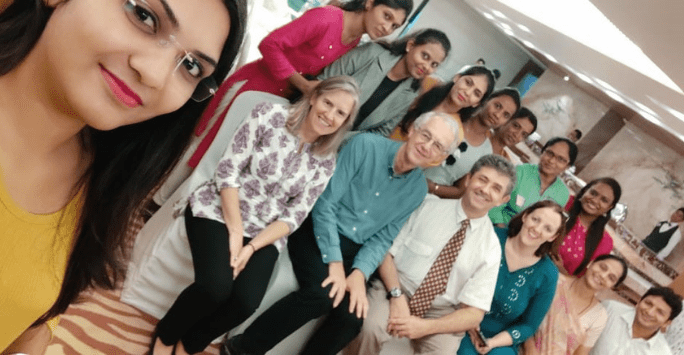
It was her experience on an elective in Malawi in South East Africa, that first ignited School Alumna Dr Kate Lightly's passion for global maternal health. And it's what has made her come full circle, bringing her back to the University of Liverpool to be a part of the Sanyu Research Unit.
Since graduating from Liverpool School of Medicine in 2006, Kate Lightly (née Thorncroft) has continued to further her interest in global maternal health alongside her postgraduate training. After completing her undergraduate and foundation programme in Liverpool, she undertook the Eleanor Bradley Fellowship in Uganda. Since then, she has been involved in various global health projects, including working with the Royal College of Obstetricians and Gynaecologists Global Health Committees whilst training in obstetrics and gynaecology in the South West region.
"My experiences of obstetrics in Malawi as a third-year medical student have shaped my entire career pathway. There were many sharp contrasts between the labour wards in Malawi and Liverpool. Yet, there were far more similarities."
Birth is a pivotal moment in life for women, their children and their families everywhere.
"Very early on in my career, I was struck with how simple interventions and compassionate and respectful maternity care could make such a difference.
Kate jumped at the chance to take up a role in the University’s Sanyu Research Unit as part of a team running an RCT (randomised controlled trial) in India.
The unit is dedicated to improving maternity care worldwide, particularly in lower-income settings, by developing and evaluating low-cost technologies for clinical care. It takes its name from Edith Sanyu, a woman who died from obstructed labour in Uganda when the unit was founded.
I am lucky to be part of a large international research group, with experts coming together from numerous fields, from around the world.
Kate's role as Trial Manager meant that she spent seven months in India with her family working with collaborators to set up the "Misoprostol or oxytocin for labour induction" (MOLI) research study and her PhD research studies.
.png) Dr Kate Lightly in India
Dr Kate Lightly in India
The MOLI trial investigates the use of an orally active E1 prostaglandin, oral misoprostol, throughout the entire induction of labour process, compared to the standard IV oxytocin protocol, which is currently used worldwide. Kate's own research studies are focused on fetal heartbeat monitoring during labour, using mixed methods research, applying Kirkpatrick’s four stage evaluation model and a before and after study, to understand the impact of a fetal monitoring training programme. This data has fed into the development of a theory of change about how fetal monitoring training could lead to improved outcomes. She has also conducted a large qualitative study exploring women and clinicians perspectives on induction of labour, intrapartum fetal monitoring and mode of birth.
"Conducting mixed methods research involves using multiple research methods, often both quantitative and qualitative, to answer research questions. For example, hearing women's voices through the qualitative interviews about women's labour experiences has been a fascinating honour and privilege."
"On the other hand, statistical analysis of a complex data set of 6500 maternal and perinatal birth outcomes has been a very steep learning curve, undertaken primarily on YouTube!
Her time in India was a very positive experience for the whole family.
My children and I will never forget the kindness we have experienced from our wonderful colleagues and friends in India and the sheer joy of wearing beautiful brightly coloured clothes and dancing into the night with neighbours who welcomed us, even when we often couldn't speak the same language.
As well as the research, Kate is grateful for the time she has had to reflect on her teaching skills and how to develop them further.
"As educators and clinicians, if we can teach our colleagues well, the impact of our work can reach far further than simply through our own interactions. If through research, we can understand how to do this even better and understand how training can initiate behaviour change, we can unlock a huge part of the black box of improving patient outcomes."
Looking to the future, Kate has just secured an interdeanery transfer to Mersey and hopes to continue both her clinical and academic career here. Kate is currently working on ongoing research projects and new projects, including editing a free global online textbook of obstetrics and educational videos for women in low-income countries.
"Ever since I was a Liverpool undergraduate, I knew what I wanted to do with my life. But back then, I didn't know how to "do" global maternal health as my ‘day job’. Hopefully, my current role at Liverpool University will mean that other doors continue to open along this career pathway."
Discover more
- Learn more about the Sanyu Research Unit Worldwide (link) and at the University of Liverpool (link).
- Interested in maternal health? Why not join SNOGS (Student Neonatal Obstetrics and Gynaecology Society) via the Guild (link).
- To read more on Global maternal health, see the Global Library of Women’s Medicine and The Continuous Textbook of Womens Medicine Series (link)